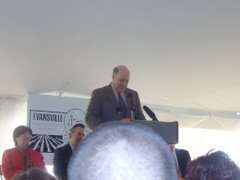Tuesday, October 02, 2012
July 2012: City Administrator gives A short history of ReOrganizations
(Ed.note: This is a recent article from July 2012 of the Evansville City Administrator, Dan Wietecha.)
The city government as an organization needs to be both effective and efficient. We need
to be effective – from the citizen’s point of view – in providing quality service. We need
to be efficient in the process – whether it means eliminating unnecessary paperwork, time
and delay, costs, etc. We need to maximize the value of our performance.
2007 ReOrganization
When then City Clerk/Treasurer Jim Bielke resigned five years ago, we used the vacancy
as an opportunity to reorganize the city’s financial offices.
The Clerk and Treasurer positions each have certain legally required duties. In general,
the Clerk has custody of and responsibility for city papers including ordinances,
resolutions, contracts, and meeting minutes. In general, the Treasurer has responsibility
for the city’s general fund including property taxes, collection of fees, and accounting for
receipts and disbursements. Since 1952, the City of Evansville had treated the two
offices as combined and had maintained the appointment of an individual to both offices.
We also had a Finance Director. This position evolved out of the longtime Financial
Director position that oversaw the accounts and finances of the Water & Light
Department. In January 2004, this position was recast with responsibility for accounting
of both the Water & Light Department and the City’s general fund.
The city offices had a split “finance department” with some responsibilities vesting with
the Clerk/Treasurer and other responsibilities vesting with the Finance Director. I
understand how we got a split department. But it did lend itself to duplication of effort.
And it resulted in an artificial division between the office employees – depending on
which supervisor they reported to, they were either Water & Light or City.
In 2007 we used the Clerk/Treasurer vacancy as an opportunity to reorganize finance
department responsibilities. We stripped the Treasurer duties separate from the Clerk and
assigned those duties as part of the Finance Director’s role. All staff, including the Clerk,
then reported to the Finance Director. This eliminated the split finance department,
aligning all the fiscal duties in one financial department. It also resulted in better office
and accounting efficiencies and improved customer service.
20112012 Lean Operations
In 2011 a number of efficiency improvements were approved. Some were implemented
then; others will be implemented this year.
The most significant was the upgrading of our accounting software. Because this will be
needed for a smart metering system in the future, WPPI Energy has offering a grant to
cover the utility billing portion of the upgrade, approximately $28,000. They also offered
a 0% loan to finance the nonbilling portion of the software, approximately $32,000.
With reduced annual maintenance fees, the city will actually come out with a net savings.
Although jobs in the finance department had been consolidated a few years ago, we
maintained separate accounting systems. Now the accounting upgrade provides a timelyopportunity to consolidate the accounting databases: streamlining office procedures and
further eliminating duplicative efforts. The consolidation was completed early this year;
however, various delays with the software upgrade itself have taken much longer.
Another related improvement was contracting with a thirdparty vendor to offer online
and phone system for paying utility bills; this has been in place since fall 2011. This has
been an excellent example of better service through ease and convenience for the
customer. It also reduces staff time for handling and processing utility bills.
And when the accounting software upgrade is completed later this summer, we will begin
having the utility bills printed and mailed from another thirdparty vendor. Although the
direct cost savings for this are pretty minimal, it will free up significant staff time.
We need to be both effective and efficient. We need to be effective – from the citizen’s
point of view – in providing quality service. We need to be efficient in the process –
whether it means eliminating unnecessary paperwork, time and delay, costs, etc. We
need to maximize the value of our performance.
2012 Executive Assistant
This spring with the resignation of then Human Resources Administrator Jodi Sam, we
again used a vacancy as an opportunity to reorganize job responsibilities within the
finance department.
The City Clerk has now taken on a greater role in human resources management. The
Human Resources Administrator position was updated to become an Executive Assistant
to help the Finance Director with accounting and bookkeeping, the City Administrator
with employment contracts and collective bargaining, and the City Clerk with payroll and
recordkeeping.
Although on a much smaller scale than the 2007 reorganization, when coupled with the
recent and ongoing lean operations, it will further focus the department’s operations.
Strategic Thinking
Over the past year, we have had a series of Committee of the Whole meetings (with
another scheduled for September 15) to deliberately attend to building capacity for lean
operations among city officials and staff. This means a commitment to improvement: a
vision for topnotch service, practical training, a focus on results, and nurturing an
organizational culture which looks past the status quo.
As the city’s governing body, the Common Council should examine existing routines and
explore innovative strategies (and/or encourage staff to). The way we performed in the
past may have been the best approach then, but it might be less productive for the future.
And some shortterm action should be seen as a means to a greater end, not as the end in
and of itself. It means getting beyond a catch phrase like “topnotch service” and
defining it in terms of specific priorities for safety, quality of life, and other public
benefits.
Subscribe to:
Post Comments (Atom)






























No comments:
Post a Comment